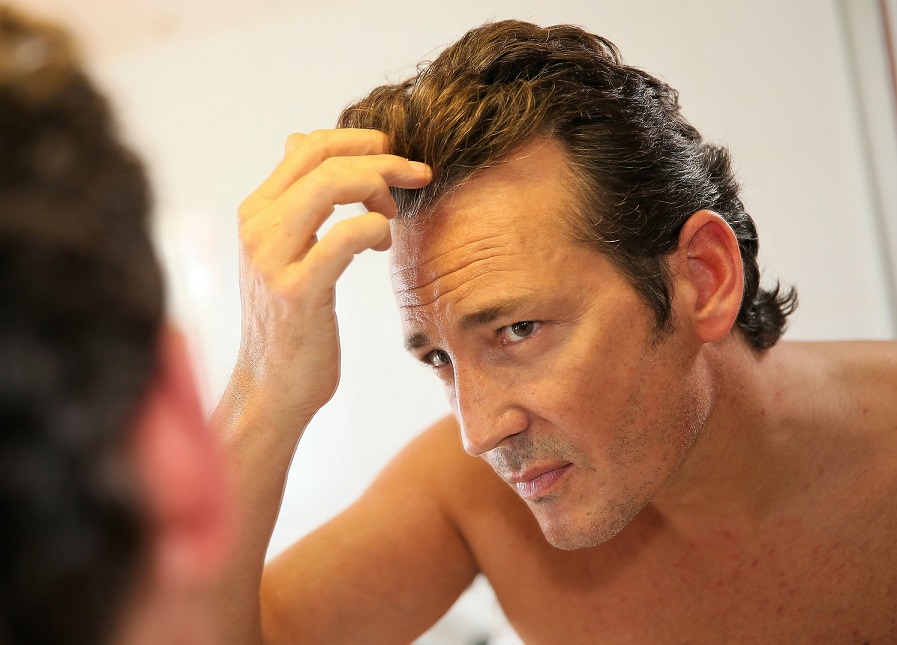Men’s Guide To Thinning Hair
Regardless of your age, men are typically more at risk of balding than women. Hair loss can occur as early as age 20, but most men start experiencing hair thinning around the age of 35+. Although hair loss is fairly common, it does not mean that it is not a devastating part of life. Often times individuals suffering from male pattern baldness can develop self-esteem issues, lack confidence, and even resort to new careers.
With this being said, it is important to know what can cause a man to lose his hair and also some treatment options available. Catching hair loss in the beginning stages is key. In this thinning hair guide for males, we are going to cover why you might be losing your hair and what you can do to combat this issue. Follow along to learn more.
Hair Thinning Causes
1.) Stress or Traumatic Event
Stress or a traumatic event can be a leading factor when it comes to hair loss. If you have ever heard of telogen effluvium, you know that it is a hair loss condition related directly to stress and hair loss. Hair will typically begin to fall out at a faster rate than normal and falls off the scalp on the top area.
2.) Nutrient Deficiency
Your hair needs vitamins and minerals each day in order to survive on the scalp. Your hair is made up mainly of proteins, so consuming enough of this on a daily basis will make certain that your locks are thriving. These proteins, vitamins, and minerals can be consumed through foods or ingested as a vitamin capsule.
3.) Medical Conditions
If you are suffering through a medical condition, this can be a contributing factor to your hair loss. For instance, if you are suffering from a low performing thyroid, hair loss can be a side effect. Similarly, chemotherapy treatment often times leads to temporary hair loss. Luckily, most medical conditions that cause hair loss are reversible.
4.) Poor Hair Products
If you are experiencing hair loss, it could be due to the products that you are using on a daily basis. Make sure you are aware of the ingredients in the shampoos, conditioners, gels, vitamins, etc. that you are using. If any of these hair products contain harmful ingredients like sulfates and parabens, it is best to stay away. These chemicals can be detrimental to your hair health.
Treatments for Hair Thinning
Now that you have a better understanding of the root causes of hair thinning, lets touch on a few of the treatments. We will go in the same order we touched on in the above hair loss causes.
Try limiting the number of stressful events that take place in your life. Make sure you are getting enough sleep and surrounding yourself with positive people. These tips can help with stressful situations.
If you have a nutrient deficiency, make sure you are taking the appropriate vitamins and minerals that your body needs in order to support a healthy scalp. This means eating foods such as fish, eggs, cheese, meats, fruits, vegetables, and nuts. All of these are high in protein and other nutrients, which are essential for healthy hair.
If you are dealing with a medical condition, make sure to consult with your doctor. Often times hair will return after treatments or medications are completed. Switch to hair products that contain natural ingredients and are free from harmful chemicals. Whether it’s shampoo, conditioner, vitamins or gels, there are plenty to choose from on the market today. Making this switch can make a big difference in your overall hair health!
Takeaway
Catching your hair loss at the beginning stages is crucial. Do not wait until your hair is falling out or balding to take action! Your hair is too precious to let it go to waste, so make sure you are paying attention and taking care of it to the best of your ability. With the help of this thinning hair guide for males, you should be able to take the proper steps to help treat your thinning hair.
Thanks for reading and supporting our sponsors!








